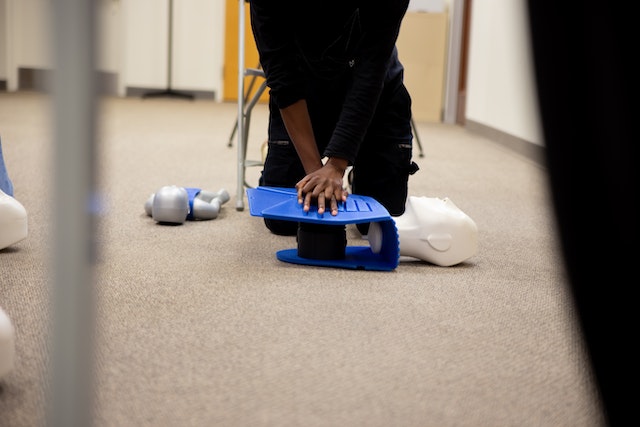
A heart attack is considered a typical men’s disease. Therefore, women, but also their treating doctors, often recognize the danger much later because the symptoms are less clear than in men. With heart health as important as aesthetics (where practitioners take aesthetics training to enhance their services) for modern women, knowing more about heart attack prevention is one that should not be neglected. Read here what you should definitely pay attention to.
Women often suffer a heart attack only at an older age
A heart attack actually affects more men than women. Nevertheless, a heart attack is also one of the most common causes of death in women. Every year, more than 20,000 women die from it in Germany – and not only that: they also have worse chances of recovery after a heart attack than men, as studies and statistics show. Statistically, however, the disease occurs later in women: only ten years after menopause (menopause). The big problem: If women suffer a heart attack, they often do not act fast enough. A study funded by the Heart Foundation by the German Center for Cardiovascular Research, for example, together with Helmholtz Zentrum München and the Technical University of Munich, showed that women over the age of 65 with symptoms of a heart attack take an average of more than four and a half hours to get to the emergency room – for men of the same age, it takes only three and a half hours.
Take complaints seriously and also think of a heart attack!
In the case of a heart attack, every minute is a matter of life or death. But women in particular often do not take their symptoms seriously, suppress them, or only speak out loud about their complaints when asked. It is often said: I don’t want to make any circumstances! But that’s a big mistake. Especially in older age, women should always have the risk of a heart attack in their heads – even if the symptoms are non-specific and cause doubts. But even younger women should not suppress the possibility of a heart attack. According to studies, they tend not to take complaints seriously enough. For them, professional obligations or the care of the children are often the top priority. In general, it is better to dial the emergency call once too much than once too little! As a small guideline, you can remember that you should get help immediately if the complaints occur on a previously unknown scale.
Why does a heart attack often occur in women only after menopause?
Women benefit from a protective effect of female sex hormones (estrogens) before menopause. They not only regulate the cycle and pregnancy but are also involved in various processes of metabolism. They affect inflammatory reactions and blood clotting, and they have a dilating effect on the blood vessels. In this way, estrogens can protect against the formation of atherosclerotic deposits in the vessels and protect against coronary heart disease. After menopause, however, hormone protection decreases: the risk of suffering a heart attack then increases more rapidly in women than in men.
How women recognize a heart attack in time
Especially in older women, the heart attack symptoms are less characteristic. The typical severe chest pain, which can also radiate to different parts of the body, is sometimes less noticeable in them than in men, for example. Women are more likely to report a feeling of pressure or tightness in the breast. Other symptoms of a heart attack may include in women:
- Shortness of breath
- Sweats
- Backache
- Nausea
- Vomit
- Pain in the upper abdomen
- Pulling in the arms
- Unexplained fatigue
- Depressions
Many of these ailments cause women to think of a harmless stomach upset first. In addition, older women often live alone and have no one to get help in an emergency. They are also often more reserved and do not want to be a burden to their fellow human beings.
Alarm signals heart attack
- Chest pain
- Pain in the upper abdomen
- Pain in the back (between shoulder blades)
If a heart attack is suspected, call 112 immediately. Since the symptoms in women are not always clear, their complaints are often misinterpreted. As a result, women are often admitted to the clinic much later than men!
ALSO READ: How a Healthy Mouth Reduces Risk of Heart Disease
Use a home emergency call system?
Older women often live alone. Then it may make sense to use a home emergency call system. Such systems are offered, for example, by the Malteser Hilfsdienst, the Johanniter, the Arbeiter-Samariter-Bund, or the German Red Cross. With an alarm button, which you wear like a wristwatch on your wrist, you can get help at any time.
If you have symptoms, also think of a heart attack
Even though women often hesitate too long to call an ambulance, the cause of delayed treatment is not entirely theirs. Even doctors are not immune to misdiagnosis and can misjudge the true cause of the symptoms if they express themselves atypically to the symptoms. For example, they initially suspect stomach or digestive problems and do not think about the heart. And hospital medical staff are also contributing to delays, as they are less likely to forward ECG results from younger women to specialists at a heart attack center for evaluation, for example. In addition, researchers at Harvard Business School have shown in a study that women are more likely to die from a heart attack if they are treated by younger male doctors — rather than by female doctors or older male doctors who have more experience.
Are women treated differently than men?
Women and men receive the same treatment in the hospital if the correct diagnosis is made. It is crucial to restore the oxygen supply to the heart muscle as quickly as possible after a vascular occlusion – which is done with catheter technology. Afterward, patients are monitored in the intensive care unit. Also, the selection of drugs and their dosage do not differ so far. Here, however, it is important to know that women are often underrepresented in large clinical trials. In most cases, only 25 percent of the study participants are female. It is now known that there are different effects and side effects in men and women. That is why international guidelines are now calling for more women to be included in studies.
Heart attack in women: knowing and preventing risk factors
Not only postmenopausal women are at risk of suffering a heart attack. Younger women between the ages of 40 and 50 are also exposed to the danger – especially if they live unhealthy lives or have family problems. If you want to effectively prevent and reduce your heart attack risk, you should combat the following risk factors:
- Overweight
- Smoke
- Hypertension
- Increased blood lipids
- Elevated blood sugar
- Psychosocial stress
- Stress
- Lack
- Unhealthy diet
The following protective factors can help prevent a heart attack:
- Movement
- Relaxation
- Smoke-free living
- Healthy nutrition
- Shared meals
- Social security
- Flu vaccination





 Getting a regular massage (마사지 ) in South Korea is very much a part of South Korean culture and lifestyle, being a relaxation technique that brings many health benefits
Getting a regular massage (마사지 ) in South Korea is very much a part of South Korean culture and lifestyle, being a relaxation technique that brings many health benefits When in South Korea, be in the know that massage clinics are widely available throughout the country. Spas and beauty shops also offer massage services in different styles and techniques. However, due to language barriers, some tourists got more than what they bargained for; not realizing that they ordered an extreme type of massage service.
When in South Korea, be in the know that massage clinics are widely available throughout the country. Spas and beauty shops also offer massage services in different styles and techniques. However, due to language barriers, some tourists got more than what they bargained for; not realizing that they ordered an extreme type of massage service.












 Apparently, slow metabolism can be a natural condition for some people, particularly the older overweight and obese individuals who are no longer interested in staying active. Alpilean can provide the solution since its formulation is designed to increase body temperature to boost slow metabolism, which in turn spurs the body to burn calories at a faster rate.
Apparently, slow metabolism can be a natural condition for some people, particularly the older overweight and obese individuals who are no longer interested in staying active. Alpilean can provide the solution since its formulation is designed to increase body temperature to boost slow metabolism, which in turn spurs the body to burn calories at a faster rate.










 During the last decades, medical cases of Indians experiencing premature heart attacks caused by coronary artery disease (CAD) confirmed observations that Indians have higher CAD mortality and morbidity risks than their foreign counterparts.
During the last decades, medical cases of Indians experiencing premature heart attacks caused by coronary artery disease (CAD) confirmed observations that Indians have higher CAD mortality and morbidity risks than their foreign counterparts.
 At the Rana Hospital, Senior Interventional Cardiologist and Director, Dr Senthilkumar Nallusamy added that consumption of trans fats and alcohol, as well as smoking and mental stress, are additional factors that increase the risks of coronary artery disease in young patients.
At the Rana Hospital, Senior Interventional Cardiologist and Director, Dr Senthilkumar Nallusamy added that consumption of trans fats and alcohol, as well as smoking and mental stress, are additional factors that increase the risks of coronary artery disease in young patients. According to Kauvery Hospitals Tiruchy’s Chief Interventional Consultant and Cardiologist, Dr S Aravindakumar, about 15 to 20 per cent of below age 40 patients who suffer from a heart disorder also suffer from mental stress. Many of them are young corporate employees, working as ITs dealing with US clients.
According to Kauvery Hospitals Tiruchy’s Chief Interventional Consultant and Cardiologist, Dr S Aravindakumar, about 15 to 20 per cent of below age 40 patients who suffer from a heart disorder also suffer from mental stress. Many of them are young corporate employees, working as ITs dealing with US clients.
